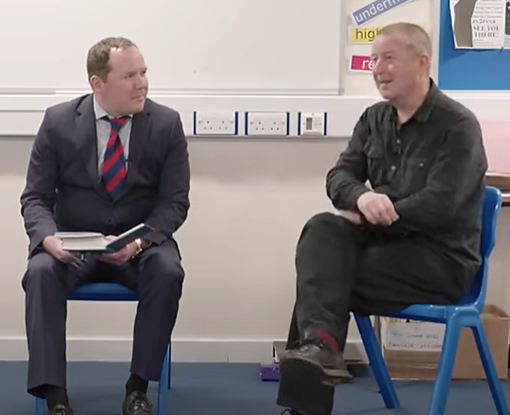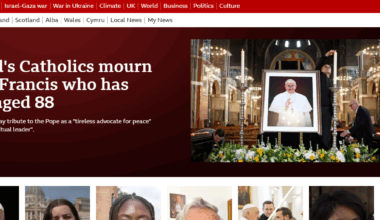Introduction
Dr Julian Baggini is a well-known popular philosopher whose many books include Atheism: A Very Short Introduction (2003), Without God, is Everything Permitted? The 20 Big Questions in Ethics (2014), The Edge of Reason: A Rational Skeptic in an Irrational World (2016), How The World Thinks: A Global History of Philosophy (2018), and How to Think Like a Philosopher (2023). An acclaimed writer, thinker, and journalist, he is also a patron of Humanists UK and co-founder of The Philosophers’ Magazine.
I moderated a debate on 12 February 2025 between him and Oxford University’s Dr Max Baker-Hytch for Premier Unbelievable on the topic of divine hiddenness. During lunch, Julian kindly agreed to an interview about his life and career. The transcript, edited for clarity and concision, is below.

Interview
Samuel McKee: Can you tell us how you became a professional philosopher?
Julian Baggini: It was all serendipitous and happenstance. I did philosophy at university not really knowing what it was. I was just interested in the big questions. It turned out to be not what I expected but I warmed to it. I didn’t think I was going to carry on in philosophy until my last year when I thought I had unfinished business with the subject, so I did a master’s. I converted this into a PhD, but even then I wasn’t thinking of being an academic.
I remember having this strange moment where I realised that virtually all of my peers were doing postgraduate work intending to be academics, and I hadn’t even thought about it. I realised I was the weird one! I did not really want to go down that route because I saw it required a very narrow focus, which I was not temperamentally suited to. So I thought, how can I continue my interest without going down the strict academic route?
After a few years, I met Jeremy Stangroom, who was a PhD in sociology and an early adopter of the internet, and together we launched The Philosophers’ Magazine. That was the platform that allowed me to write more, and it just evolved from there. I gave up all my side jobs and became a full-time writer.
You’ve written a lot of books now and are very skilled at making big philosophical ideas accessible to the general public. Why do you write for a popular audience, and what are you trying to achieve in doing so?
To be honest, a lot of the time, the interest for me in writing books is in trying to get things clear for myself! So there is a selfish motivation, too.
There are three things I am trying to do with my writing. One, to make things clear. Two, to join the dots. For example, with my book on free will, Freedom Regained: The Possibility of Free Will (2015), I knew that there were already lots of books on the subject, but none that covered the full range of freedoms—things like political freedom and metaphysical freedom, but also elements involving psychology, etc. So there, I was making things clear and joining the dots, making connections.
Three, to make philosophy relevant to people’s lives so that they can apply it.
I am always trying to do these three things in a way that is as engaging as possible, and it is always a challenge. It is not easy. I have written a lot of books, but I assure you I don’t just knock them out! [Laughter] There is a lot that goes into them and a lot of crafting.
How do you decide what you want to write about next?
Any author who says that it is down to what they want is dishonest. In the real world, you must come up with something the publisher is interested in. I am quite lucky in that I have a very good relationship with Granta Books, and I have done a few books with other editors. It is a question of having a set of things that I’m interested in that I can get the publisher interested in, too. There is no shortage of things to write about, and I have so many things that I haven’t done.
Do you have a favourite branch of philosophy?
I’m not sure that I do. I like to write about epistemology and ethics, etc., but my work on those issues is not narrowly focused on them. I have a disinterest in metaphysics. Some might say that free will is a metaphysical issue, but I’m not so sure about that. I just think that when it comes to the nature of ultimate reality, the idea that we are going to say anything interesting about it by doing philosophy just feels too speculative for me (this might sound insulting to people who do do it!). I am not too keen on building these grand systems, you know? I’m more of an Aristotelian.
You wrote the ‘Very Short Introduction’ to atheism for Oxford University Press. Do you have a religious background? How did you become a voice for atheism and humanism?
I grew up in a nominally Christian home and went to Catholic primary school. But we were not really practising. My secondary school was non-denominational, and I stayed a Christian through my teenage years. I ended up going to a Methodist Church. I lost my faith in my late teens through a slow process.
Was that for philosophical reasons?
Broadly, in the sense that I had the kind of doubtful questions people start to ask about religion. I found the answers very unsatisfactory. That’s the short answer. Eventually, I just thought, ‘Well, I’m an atheist.’
The reason I wanted to write the book was that I had certain frustrations at the time (2005) that atheists were being characterised as dogmatic and rabidly anti-religion. I was neither of those things. I didn’t need to be agnostic, not because I’m 100% dogmatically convinced, but because I think that atheism is where the evidence points to. That motivated me to write the book. Interestingly, that was before Richard Dawkins’s The God Delusion came out and before the emergence of the New Atheism to public prominence, which I was then tearing my hair out about because it just seemed to confirm those stereotypes. Things have settled down a bit now.
You were one of the keynote speakers at the Humanists UK Convention last year. Are you seeing humanism become a more viable, popular option for people who aren’t religious?
Humanists UK has grown massively in membership, and it has done very well under Andrew Copson, the Chief Executive. A lot of people say that they didn’t realise they were a humanist but that is what they are. I think that is perhaps why it is growing a bit. I have a friendly, critical relationship with humanism as I don’t think it should become too prescriptive or a dogma. It should be a broad church, to use that phrase. I also think it struggles in the sense that in a religion, you have a more inherent or intrinsic reason and motivation to gather together. A lot of people like me don’t have a desire to go to humanist meetings or groups. Humanism binds people more weakly than religion does. It is good that people are more aware that it is an option for them, but I don’t know how big we could get.
It is certain that everyone holds some beliefs that are false. We’ve moved into an age of mass conspiracy theories and tribal political divisions. How can people better equip themselves to ensure that they don’t hold too many false beliefs?
It is so tricky to give a simple answer to that. The advice only works if you implement it properly. One of the great things is to think for yourself. Challenge the evidence. Of course, every time you hear a conspiracy theorist, they will tell you that that is exactly what they have done—they have not accepted the conventional narrative, and they have looked at the facts for themselves. The problem is that they have done it badly. But they are trying to do the right thing.
One of the main things one should do is cultivate epistemic virtues. Forget critical thinking skills—you need epistemic virtues. You need to be ruthlessly honest with yourself about your own reasons and motivations for why you might believe what you believe. You’ve got to really pay close attention to whatever evidence you’re looking at and not just accept it at face value. So I think people need to focus more on the virtues of a good thinker rather than on any particular critical thinking skills or taking any kind of course.
Related reading
Evil gods and fun with philosophy: Interview with Professor Stephen Law, by Samuel McKee
‘Religion is a killer now’: interview with Professor Peter Atkins, by Samuel McKee
Bringing back the dialectic: interview with Stephen ‘Rationality Rules’ Woodford, by Samuel McKee
The new faces of unbelief for Generation Z: the rise of the British social media atheists, by Samuel McKee
Can there be peace in the culture wars? Interview with A.C. Grayling, by Daniel James Sharp
‘Nobody really understands what the consequences are’: Susie Alegre on how digital technology undermines free thought, by Emma Park
Consciousness, free will and meaning in a Darwinian universe: interview with Daniel C. Dennett, by Daniel James Sharp
‘The real beauty comes from contemplating the universe’: humanism with Sarah Bakewell, by Emma Park
What I believe: Interview with Andrew Copson, by Emma Park








Your email address will not be published. Comments are subject to our Community Guidelines. Required fields are marked *
Donate